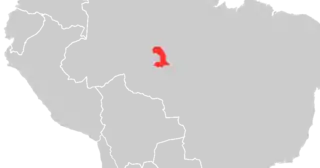Mura language
Mura is a language of Amazonas, Brazil. It is most famous for Pirahã, its sole surviving dialect. Linguistically, it is typified by agglutinativity, a very small phoneme inventory (around 11 compared to around 44 in English), whistled speech, and the use of tone.
| Mura | |
|---|---|
| Bohurá | |
| Buxwaray | |
| Region | Amazon |
| Ethnicity | 1,500 Mura people (1995)[1] |
Native speakers | 360 (2000)[1] mostly monolingual[1] |
| Dialects | |
| Latin script | |
| Language codes | |
| ISO 639-3 | myp Pirahã (Mura) |
ffg Bohura (not ISO) | |
cvf Yahahi (not ISO) | |
| Glottolog | pira1253 |
 The attested extent of Mura and Matanawi | |
In the 19th century, there were an estimated 30,000–60,000 Mura. It is now spoken by only 300 Pirahã people in eight villages.
Dialects
Since at least Barboza Rodrigues (1892) [reference?], there have been three ethnic names commonly listed as dialects of Mura, or even as Muran languages. The names are:
- Bohurá, or Buxwaray, the original form of the name 'Mura'; spoken on the Autaz River[2]
- Pirahã, or Pirahá, Pirahán, the name the remaining dialect goes by
- Yahahí, also spelled Jahahi; spoken on the Branco River[2]
On the basis of a minuscule amount of data, it would appear that Bohurá (Mura proper) was mutually intelligible with Pirahã; however, for Yahahí there exists only ethnographic information, and it can be assumed they spoke the same language as other Mura. Rodrigues describes the Yahahí as having come from the Branco river, a tributary of the right bank of the upper Marmelos river. The last Yahahí are said to have joined the Pirahã.
The Mura/Bohurá endonym is Buhuraen, according to Barboza Rodrigues (1892), or Buxivaray ~ Buxwarahay, according to Tastevin (1923). This was pronounced Murá by their neighbors, the Torá and Matanawi. In his vocabulary, Rodrigues lists Bohura for the people and bhurai-ada "Mura language" for the language, from the Mura of the Manicoré River; Tastevin has Bohurai and bohuarai-arase for the same. They also record,
- nahi buxwara araha "That one is Mura"
- yane abahi araha buxwarái "We are all Mura"
(Caution: these words need to be confirmed. The scanned text of Nimuendaju (1948) at the link has several errors, such as ⟨c⟩ for ⟨e⟩, ⟨h⟩ for ⟨b⟩, and ⟨d⟩ for ⟨á⟩.)
Genealogical relations
Mura is often proposed to be related to Matanawí. Kaufman (1994) also suggests a connection with Huarpe in his Macro-Warpean proposal.
Vocabulary
Loukotka (1968) lists the following basic vocabulary items for Mura language varieties.[2]
gloss Múra Bohurá Pirahá one huyiː two mukui head a-pái hana-pai a-paixi ear ku-pái hane-apue apu-pay tooth aro-pái haine-tué atu-pay hand upa hane-uí upai woman yúehẽ kairi yuéhe water pé ipé pé fire foai huai wái stone atí atí begé maize chihuha tihoʔahai chifuä tapir kabachí kabatí kauátei
Below is a comparison of Mura and Pirahã words from Salles (2023):[3]: 959
English gloss Mura Pirahã long peissí piiʔi short kutjúhi koihí big itokúi itohí male foreigner auí aooí female foreigner aurí aogí wild pig bahúis bahóisi louse tihyhí tihíihi flour arais ágaísi tobacco itíhi tíhi leaf itai tai fire uái hoái blood bê bií bone ái aí sleep aitáhus aitáhoi die kwoabís koabaipí drink pitaissa pitáipí stay abaái abí say aihyahá ahoái sun huisí hisó moon kaãnhê kaháíʔái cold arí agí feisty aupís aáopí far kái kaáo bad babihí baábi(hi)
Notes
- Mura at Ethnologue (18th ed., 2015) (subscription required)
- Loukotka, Čestmír (1968). Classification of South American Indian languages. Los Angeles: UCLA Latin American Center.
- Salles, Raiane (2023). "Pirahã (Apáitisí)". In Epps, Patience; Michael, Lev (eds.). Amazonian Languages: Language Isolates. Volume II: Kanoé to Yurakaré. Berlin: Walter de Gruyter. pp. 957–994. ISBN 978-3-11-043273-2.
Bibliography
- Campbell, Lyle. (1997). American Indian languages: The historical linguistics of Native America. New York: Oxford University Press. ISBN 0-19-509427-1.
- Everett, D. L. (1992). A língua Pirahã e a teoria da sintaxe: descrição, perspectivas e teoria. Campinas: Editora da Unicamp.
- Hanke, W. (1950a). O idioma Mura. Arquivos: Coletânea de documentor para a História da Amazônia, 12:3-8.
- Hanke, W. (1950b). Vocabulário e idioma mura dos índios mura do rio Manicoré. Arquivos, 12:3-8.
- Heinrichs, A. (1961). Questionário: Mura-Pirahã Rio Marmelos. (Questionário dos Vocabulários Padrões para estudos comparativos preliminares de línguas indígenas brasileiras.) Rio de Janeiro: Museu Nacional.
- Heinrichs, A. (1963). Questionário: Mura-Pirahã Rios Marmelos e Maici. (Questionário dos Vocabulários Padrões para estudos comparativos preliminares de línguas indígenas brasileiras.) Rio de Janeiro: Museu Nacional.
- Kaufman, Terrence. (1994). The native languages of South America. In C. Mosley & R. E. Asher (Eds.), Atlas of the world's languages (pp. 46–76). London: Routledge.
- Curt Nimuendajú (1948): "The Mura" and "The Yahahi", in Handbook of South American Indians, Volume 3: The Tropical Forest Tribes, ed. Julian H. Steward, pp. 255–269.